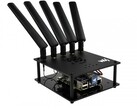While 5G connectivity is set to transform the future of data, 4G networks aren't necessarily slow or unreliable. In some countries, telecom providers provider remarkably fast connectivity on their existing 4G networks. A combination of over-engineered infrastructure and relatively high data costs means that certain networks in South Korea and the United Arab Emirates are able to offer exceptionally fast 4G speeds.
The UAE's Etisalat, for instance, delivers 98.78 Mbps on average, the fastest 4G in the world. South Korea's SK Telecom trails a bit behind but still offers a zippy 89.54 Mbps connection. In contrast, average 4G speeds in the United States hover around 30 Mbps. A large population of 4G users and congested network infrastructure in population centers means that many people aren't getting high-speed mobile connectivity. It'll be interesting to see how best-in-class 4G compares with sub-6GHz 5G.
An OpenSignal report indicates that average 5G speeds in the US are in the 50 Mbps range, a fraction of the theoretical maximum. This is due to network congestion and because few carriers are deploying mmWave widely.
What does this mean for smartphone users? 5G will definitively bring speed and latency improvements. But, compared to top-end 4G connectivity, the change might not exactly be transformative.









